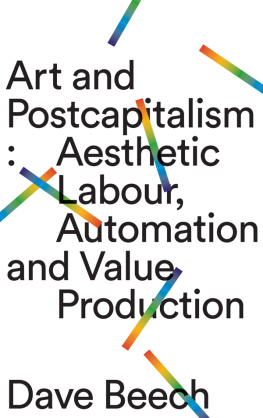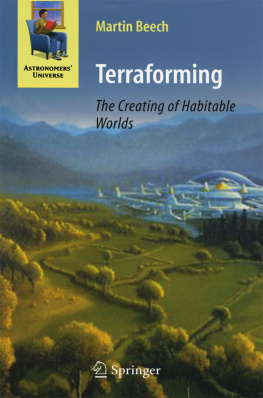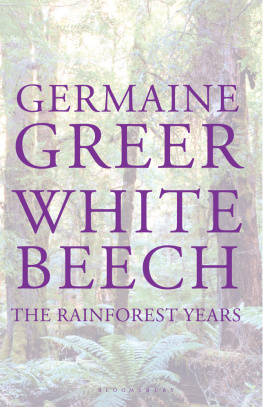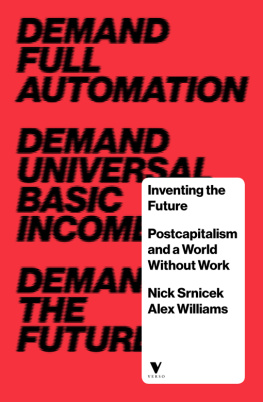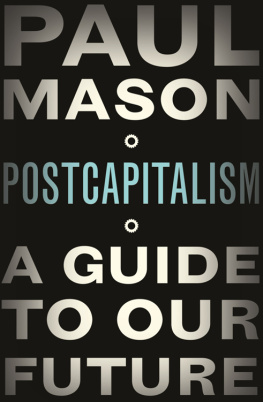Dave Beech - Art and Postcapitalism
Here you can read online Dave Beech - Art and Postcapitalism full text of the book (entire story) in english for free. Download pdf and epub, get meaning, cover and reviews about this ebook. publisher: Book Network Intl Limited trading as NBN International (NBNi), genre: Politics. Description of the work, (preface) as well as reviews are available. Best literature library LitArk.com created for fans of good reading and offers a wide selection of genres:
Romance novel
Science fiction
Adventure
Detective
Science
History
Home and family
Prose
Art
Politics
Computer
Non-fiction
Religion
Business
Children
Humor
Choose a favorite category and find really read worthwhile books. Enjoy immersion in the world of imagination, feel the emotions of the characters or learn something new for yourself, make an fascinating discovery.
- Book:Art and Postcapitalism
- Author:
- Publisher:Book Network Intl Limited trading as NBN International (NBNi)
- Genre:
- Rating:3 / 5
- Favourites:Add to favourites
- Your mark:
- 60
- 1
- 2
- 3
- 4
- 5
Art and Postcapitalism: summary, description and annotation
We offer to read an annotation, description, summary or preface (depends on what the author of the book "Art and Postcapitalism" wrote himself). If you haven't found the necessary information about the book — write in the comments, we will try to find it.
Art and Postcapitalism — read online for free the complete book (whole text) full work
Below is the text of the book, divided by pages. System saving the place of the last page read, allows you to conveniently read the book "Art and Postcapitalism" online for free, without having to search again every time where you left off. Put a bookmark, and you can go to the page where you finished reading at any time.
Font size:
Interval:
Bookmark:

Art and Postcapitalism
Aesthetic Labour, Automation
and Value Production
Dave Beech

First published 2019 by Pluto Press
345 Archway Road, London N6 5AA
www.plutobooks.com
Copyright Dave Beech 2019
The right of Dave Beech to be identified as the author of this work has been asserted by him in accordance with the Copyright, Designs and Patents Act 1988.
British Library Cataloguing in Publication Data
A catalogue record for this book is available from the British Library
ISBN 978 0 7453 3925 2 Hardback
ISBN 978 0 7453 3924 5 Paperback
ISBN 978 1 7868 0508 9 PDF eBook
ISBN 978 1 7868 0510 2 Kindle eBook
ISBN 978 1 7868 0509 6 EPUB eBook
This book is printed on paper suitable for recycling and made from fully managed and sustained forest sources. Logging, pulping and manufacturing processes are expected to conform to the environmental standards of the country of origin.
Typeset by Stanford DTP Services, Northampton, England
To my art teachers
In memory of Stroud Cornock,
artist and teacher
19382019
This book was written while I was a Professor of Art at Valand Academy, University of Gothenburg, and a Senior Lecturer in Fine Art at Chelsea College of Arts, London. I want to thank colleagues at both institutions for their continued support and critical interrogation of the ideas that I set out in this book. I also want to thank comrades in the Marxism in Culture lecture series based at University College London.
An early version of my analysis of the forms of activity and types of subjectivity included in contemporary postcapitalist theory was delivered in October 2017 at AltMFA, an alternative educational organisation established by artists for artists in London. Also, in October 2017, I gave a presentation on the concept of postcapitalism for the Collection Collective seminar In the Future All Our Homes Will Be Museums at the Kunsthalle Bratislava. Since both presentations were shaped, in large part, by an email conversation that I had with Peter Hudis about the transformation of work and life in postcapitalism, I want to thank Peter for his generosity in explaining some key principles for thinking about postcapitalism.
An earlier version of my argument about postcapitalism in relation to questions of work rather than art was developed as an article for Parse journal. As part of the open peer review process I am grateful to have received excellent feedback from Sarah Brouillette and Jasper Bernes. I also want to thank Marina Vishmidt for making this possible. I gave the first presentation of my rereading of theories of nonalienated labour at the University of British Columbia, Vancouver, in 2017, at the invitation of Gareth James. I am indebted to the audience for raising serious questions about my methodology and conclusions. I hope that the arguments in this book have been improved as a result, but I also hope that if problems persist then I will hear about it.
My investigation of nonalienated labour was significantly extended and improved by an email exchange with the great generosity of the Marxist art historian Andrew Hemingway, for which I am deeply thankful. I have also benefitted from exchanges with Jason Bowman, Andrea Phillips, Mick Wilson, Tom Cubbin, Josefine Wikstrm, Bruno Gulli, Alberto Toscano and Charles Esche. My thanks to Kim Charnley for comments on an early draft and to Bryan Parkhurst for commenting in such detail on the first full draft of the manuscript.
Thanks also to Jakob Horstmann for making this book possible and for making it better.
I would like to thank the CCW Graduate School for awarding me research time to complete this book.
Postcapitalism, Critique and Art
This book contributes to the political theory of art. Prompted by an observation that current debates on postcapitalism differ from their nineteenth- and twentieth-century counterparts (socialism, communism and anarchism) by omitting art from descriptions of universal emancipation, this book sets out to reconstruct the politics of art through the lens of the supersession of the capitalist mode of production. In doing so, however, I confront the political imaginary of contemporary art. Today, evidently, art is replete with critical practices but typically lacks a clear understanding of the difference between resisting the existing social system and superseding it. In order to assess the various theories of arts hostility to and complicity with capitalism, I will draw on contemporary value theory to focus the analysis on the contradiction between value production and the production of material wealth that characterises both (1) what is distinctive about work in the capitalist mode of production and (2) what is decisive in the transition from capitalism to postcapitalism.
Value theory is a relatively recent tendency within Marxism and post-Marxism that arose in the wake of the collapse of the Soviet Union, the rise of the global justice movement in the 1990s and the financial crisis of 20078.
This diverse movement indicates that despite the notion, which became widely voiced after 1989, that there is no alternative to capitalism, increasing numbers of people around the world are searching for such an alternative. However, there appears to be little or no consensus within the global-justice movement as to what such an alternative might consist of.
Value theorists respond to this issue specifically by arguing that the principal advocates of the so-called traditional left made grave errors in their definitions of capitalism and therefore misconceived the nature of postcapitalism. Value theory declares that postcapitalism is not achieved with the workers state, the redistribution of wealth, decommodification, the abolition of money or the collective ownership of the means of production but only with the supersession of value production. I will adhere to this principle without endorsing the political abandonment of the workers movement or the emphasis on the commodity and commodity form, as some of its leading exponents have concluded.
Postcapitalism today is not another word for communism but the name of a political project that deliberately distances itself, to a greater or lesser extent, from the Marxist and socialist tradition. Contemporary postcapitalism binds itself uneasily to historical postcapitalism through repeated acts of revision, rejection and critique. Prominent authors of postcapitalist theory such as Paul Mason, Nick Srnicek and Alex Williams, Katherine Gibson and Julie Graham, Kathi Weeks, Miya Tokumitsu, Moishe Postone, Michael Heinrich and John Holloway, share an exasperated discomfort with the history of the anticapitalist struggle, despite the diversity of their political and theoretical projects. Contemporary postcapitalism, it could be said, is the intellectual programme, variously conceived, to extend the radical emancipatory politics of the left by leveraging it away from the ostensibly narrow concerns of the workers movement.
What has happened, among other things, is that the micropolitics of work not only brackets itself off from the workers movement but preserves and conceals a hostility to the working class and the workers movement in its dream of worklessness. When political theorists after 1968 refer to the traditional left as a narrowly-conceived class politics that suppresses all other political discourses and movements, the term traditional left is deployed to identify only those specific elements of the socialist and Marxist traditions to be jettisoned by the new politics and therefore is necessarily a distortion because it represents the breadth of socialist and communist traditions from the perspective of what they lack. When the workers movement aligned itself with anticolonial, feminist, ecological and peace movements, for instance which it did from the start and regularly throughout these instances are extracted from the traditional left as if they did not belong there.
Font size:
Interval:
Bookmark:
Similar books «Art and Postcapitalism»
Look at similar books to Art and Postcapitalism. We have selected literature similar in name and meaning in the hope of providing readers with more options to find new, interesting, not yet read works.
Discussion, reviews of the book Art and Postcapitalism and just readers' own opinions. Leave your comments, write what you think about the work, its meaning or the main characters. Specify what exactly you liked and what you didn't like, and why you think so.

